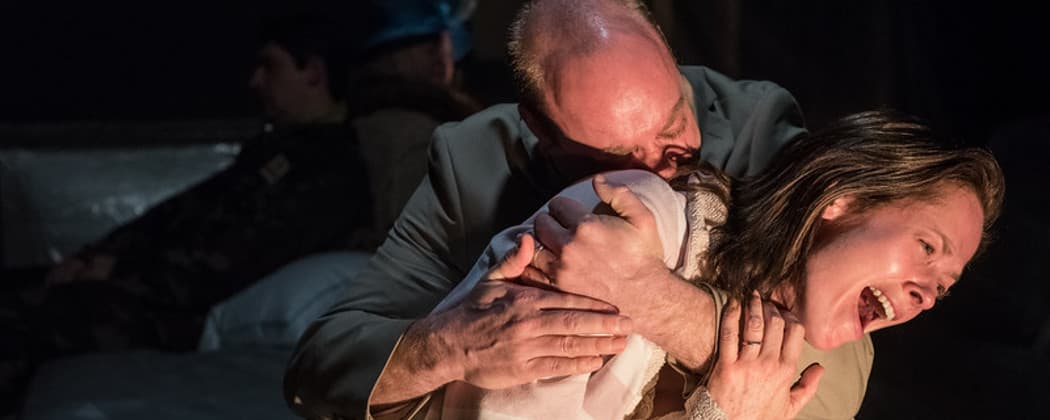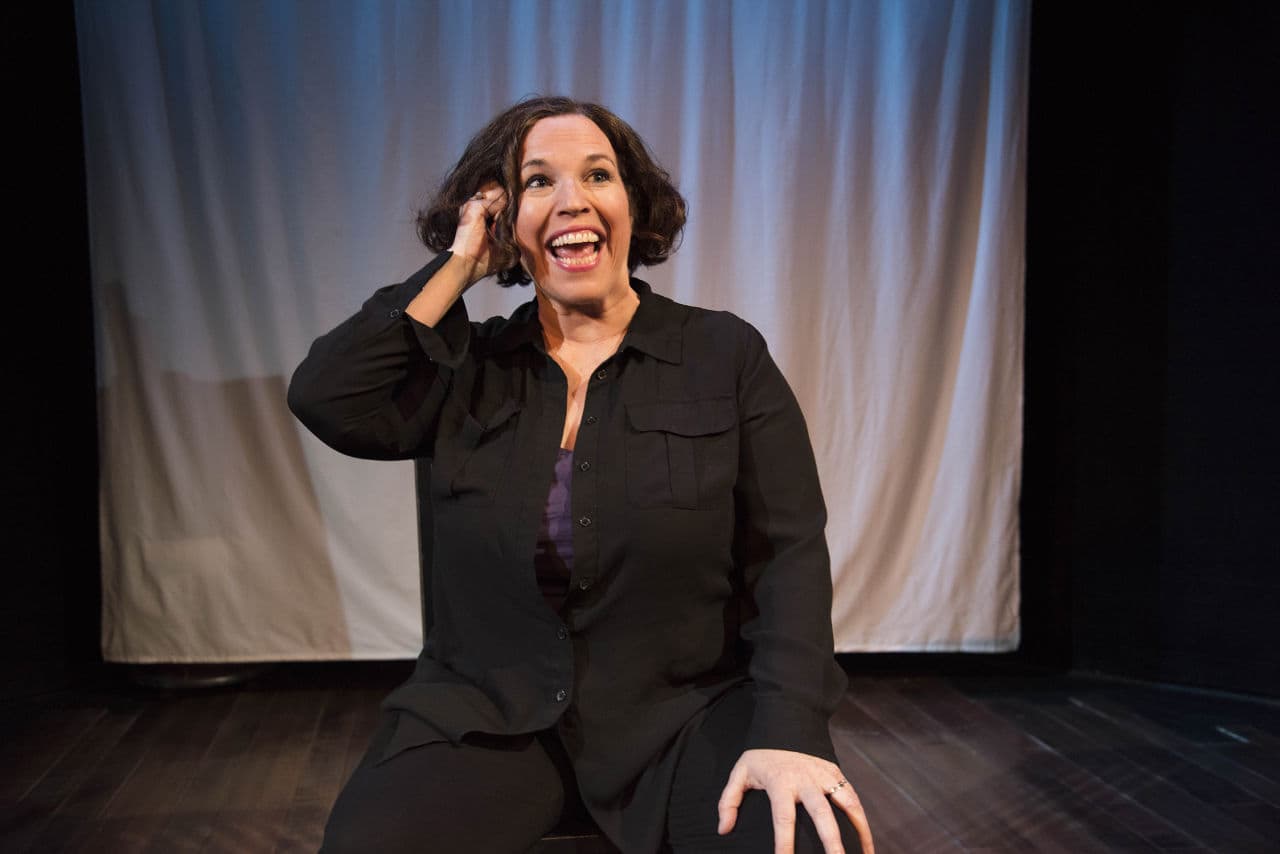Advertisement
'Stronger Than The Wind' And 'God's Ear' Bring The Pain Of Parenthood To The Stage

Parenthood is an undertaking certain to break hearts, and that’s if all goes well. Children, after all, have the traitorous tendency to grow up, and to grow opaque; what more painful separation than to lose the primal connection to a child when she starts turning into a person in her own right, with her own ideas, opinions and secrets?
But there are worse things. Two plays currently on the Boston scene address more painful parenting situations: One examines the need for contending with devastating health challenges, while the other examines the aftermath of a child’s tragic death.
Alice Manning’s one-act play, “Stronger Than the Wind,” takes its title from a moment Manning recounts from her own life as the mother — the “over-the-top mother” that she tried not to become, as she puts it — of a special needs child. When her twin sons Aidan and Tristan were born, the infants were a little underweight and so were put into the hospital’s NICU (Neonatal Intensive Care Unit). What the hospital didn’t tell the parents was that a bacterial outbreak was in progress in the NICU. Aidan was placed near infants affected by the bacteria, and ended up becoming infected, himself. The result — after a harrowing ordeal that left the baby comatose for more than three weeks and entailed five brain surgeries — was an ongoing health crisis, the opening salvo of which demolished the business Manning’s husband ran and left the family saddled with medical bills amounting to $2 million.

Manning presents her story in a spare — but unsparing — manner, using only a couple of chairs for props and delivering the entire show in a tight 75 minutes. Her panic, outrage and exhaustion are palpable, but her wit stays razor-sharp as she dissects experiences with unhelpful doctors and unsympathetic school functionaries. (In her most on-target zinger, Manning refers to one specialist as “Dr. Condescendingstein.”) She weaves the strong and weak points of family and faith, and a traumatic past experience, into a seamless roller-coaster ride through medical crisis hell — and comes out the other side intact, even grateful.
“Stronger Than the Wind” is the second in a three-part series of works by women in theater that comprises the Second Annual Next Rep Black Box Festival. (The first part, Jessica Dickey’s “The Amish Project,” ran in black box space at the Arsenal Center for the Arts, where “Stronger Than the Wind” continues through April 5. The third production in the series, Antonia Lassar’s “God Box,” follows, running April 5-19.)
Meanwhile, in Cambridge, Jenny Schwartz’s funny and bracing “God’s Ear” has a way of making you feel like it’s actively rummaging through your subconscious, making associations on your behalf that impress with their to-the-marrow shrewdness and veracity. It’s a vaguely discomforting experience, but also a deeply sympathetic one.
“God’s Ear,” running through April 12 at the Davis Square Theatre in a Thomas Derrah-directed production by the Actors’ Shakespeare Project, is part word salad, part emotional ground glass — a verbal kaleidoscope constructed from shards of dialogue and time. It’s not that the play isn’t linear; it’s more a matter of Schwartz investigating the recursive, repetitious nature of relationships and the conversations that happen within them. Mel (Tamara Hickey) and Ted (Gabriel Kuttner) are a married couple who have lost their son; it doesn’t take long to piece this together, or to catch on to what the tragedy has done to them as individuals, and as a couple.
Ted’s work entails a lot of travel, which one senses is fine by him — and perhaps with Mel, also. These are two people who need space for their grief, and for their towering resentments. Ted phones home every chance he gets, but their chats are hardly ameliorative; neither Ted nor Mel quite know how to connect, because they’re too overwhelmed and have yet to organize their own thoughts. Ted’s phone conversations with Mel fall into spiraling patterns, dominated by Mel, whose verbal outpourings are almost hallucinogenic.

Ted listens faithfully, but at the same time he doesn’t try to hide the fact that while he’s away from home he hires call girls. One of them, Lenora (Marianna Bassham), has her own complicated relationship full of convoluted emotional meanings, which raises the question of whether Mel really is as nuts as she sounds, or whether Ted simply hears her that way. When he’s not with a call girl, Ted likes to shoot pool at bars where he gets into rougher, more masculine strains of talk with people like the generic “Guy” (Dave Rich), with whom he trades barbs, but also with whom he half-jokingly entertains the idea of a permanent wife swap.
Mel might be a stay at home mom, but her attentions are imperfectly focused on the couple’s younger child, Lanie (Josephine Elwood), who knows that things between her parents have soured, and has some idea as to why. When Lanie agrees to help her mother gather up all of her brother’s old action figures and bury them, one suspects it’s with the hope that the grip of her brother — dead, but not entirely laid to rest — will at last be loosened. But distorted markers of childhood, borne of grief and loss, are irrepressible in Mel’s world; she interacts with the Tooth Fairy (Ann Carpenter) and with a G.I. Joe (John Kuntz) who, having escaped from his grave in the back yard (and constantly tugging on his own pull string) serves as a verbose reminder of her loss.
Her hair straight and stringy, dressed perpetually in pajamas, Mel looks like a candidate for the bughouse, and you can’t help but think if Ted were in any better shape he’d notice it. But he’s not; Ted has his moments of slipping sanity, too, when what he’s reporting via his cell phone cannot possibly be true — such as the scene in which a cross-dressing flight attendant (Kuntz again, in a dual role) has a gun to his head as a way of insisting that it’s time to hang up and pay attention to the safety demonstration. (Costumer Gail Astrid Buckley starts with sensible clothing, and then gallops off in deliriously colorful directions.) Ted and Mel’s moods, like their sense of reality, are given to giddy, erratic transformations; there are moments when characters burst into song, or dissolve in laughter, or nearly get into brawls. In other words, it’s not just language that’s been shattered here, but psyches as well.

Cristina Todesco’s scenic design features plastic wrap draped over unfinished wall frames and swaddled about Mel’s exercise bike and Ted’s luggage. It’s instantly, viscerally effective shorthand for personal suffocation and familial dissolution. But the play is designed never to drag, and Derrah ensures that things keep flying along; Schwartz’s dialogue sparkles and lacerates by turn, and the set’s use of a separate rear space, observable through a long rectangular window, lends a cinematic quality to the staging. The set’s architecture makes it possible for Derrah to give us the live-theater version of a split-screen or a montage sequence. It’s clever staging suited to a piece of frightful, sharp writing. Catharsis for these people doesn’t come easily, but when it does arrive, it’s earned.
Kilian Melloy has reviewed film and theater for a number of publications, including EDGE Boston and the Cambridge Chronicle. He is a member of the Boston Theater Critics Association and the Boston Online Film Critics Association.